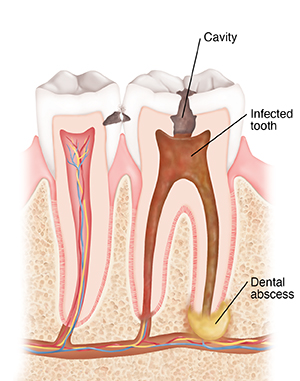Dental Abscess
An abscess is a sac of fluid (pus). A dental abscess forms when a tooth or the tissue around it becomes infected with bacteria. The bacteria can enter through a cavity or a crack in a tooth. It can also infect the gum tissue or bone around a tooth. An untreated abscess can cause the loss of the tooth. It can even spread to other parts of the body and become life-threatening.

Symptoms of a dental abscess
Symptoms include:
-
Toothache, often severe
-
Tooth pain with hot, cold, or pressure
-
Red gums
-
Pain in the gums, cheek, or jaw
-
Bad breath or bitter taste in the mouth
-
Trouble swallowing or opening the mouth
-
Fever
-
Swollen or enlarged neck glands
Diagnosing a dental abscess
The dentist will ask about your symptoms and check your teeth and gums. You will be told if you need any tests, such as dental X-rays.
Treating a dental abscess
Treatments for a dental abscess may include:
-
Antibiotic medicines. These treat the underlying infection.
-
Pain relievers. These help you feel more comfortable. Your healthcare provider may prescribe a medicine for you. Or you may use over-the-counter pain relievers, such as acetaminophen or ibuprofen, unless another pain medicine was prescribed. Talk with your healthcare provider before using these medicines if you have chronic liver or kidney disease. Also talk with your provider if you’ve had a stomach ulcer or gastrointestinal (GI) bleeding.
-
Warm saltwater rinses. These can soothe mild pain and help clear away pus.
-
Root canal surgery. This may be done if needed to save the tooth. With a root canal, the infected part of the tooth is removed. A special substance is then used to fill the empty space in the tooth.
-
Draining the abscess. This may be done if needed. Cuts (incisions) are made to let the infected material drain from the tooth.
-
Removing the tooth. This is done in cases of severe infection that can’t be treated another way.
You may need to be admitted to a hospital if the infection is severe, has spread, or doesn’t respond to treatment.
When to get medical advice
Call your dentist or healthcare provider right away if you have any of the following:
-
Fever of 100.4°F ( 38°C) or higher, or as directed by your healthcare provider
-
More pain, redness, drainage, or swelling in the treated area
-
Face or jawbone swelling
-
Pain that can't be controlled with medicines
-
Pus drains from the tooth
Call 911
Call 911 if any of these occur:
-
Unusual drowsiness or confusion
-
Weakness or fainting
-
Headache or stiff neck
-
Trouble swallowing, breathing, or opening your mouth
-
Swollen eyelids or vision problems
Preventing dental abscess
To prevent another abscess in the future, keep your teeth clean and healthy. Brush twice a day and floss at least once daily. See your dentist for regular exams and tooth cleanings. Avoid excessive sugary foods and drinks that can lead to tooth decay. If your teeth experience any trauma, see your dentist as soon as possible.